
It's about how to be a professional English reader.
- Subject:
- Languages
- Material Type:
- Student Guide
- Author:
- Samih Alkhouly
- Date Added:
- 04/25/2023

It's about how to be a professional English reader.
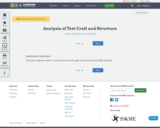
This lesson explores author's craft and structure through articles that directly affect students.

This course is designed to prepare students to score well on the English, reading, and writing sections of the ACT. The following lessons focus on introducing students to strategies and reviewing key skills that will help them on the test. Instructors can modify this course as necessary to fit with the needs of their students. It’s even comprehensive enough that students can be assigned the course independently if instructors add links and instructions to the appropriate lessons to direct students to the practice sections that the instructor desires for students to complete.

The 11th grade learning experience consists of 7 mostly month-long units aligned to the Common Core State Standards, with available course material for teachers and students easily accessible online. Over the course of the year there is a steady progression in text complexity levels, sophistication of writing tasks, speaking and listening activities, and increased opportunities for independent and collaborative work. Rubrics and student models accompany many writing assignments.Throughout the 11th grade year, in addition to the Common Read texts that the whole class reads together, students each select an Independent Reading book and engage with peers in group Book Talks. Students move from learning the class rituals and routines and genre features of argument writing in Unit 11.1 to learning about narrative and informational genres in Unit 11.2: The American Short Story. Teacher resources provide additional materials to support each unit.

In this unit, students will take a look at the historical vision of the American Dream as put together by our Founding Fathers. They will be asked: How, if at all, has this dream changed? Is this dream your dream? First students will participate in an American Dream Convention, acting as a particular historical figure arguing for his or her vision of the American Dream, and then they will write an argument laying out and defending their personal view of what the American Dream should be.
ACCOMPLISHMENTS
Students read and annotate closely one of the documents that they feel expresses the American Dream.
Students participate in an American Dream Convention, acting as a particular historical figure arguing his or her vision of the American Dream.
Students write a paper, taking into consideration the different points of view in the documents read, answering the question “What is the American Dream now?”
Students write their own argument describing and defending their vision of what the American Dream should be.
GUIDING QUESTIONS
These questions are a guide to stimulate thinking, discussion, and writing on the themes and ideas in the unit. For complete and thoughtful answers and for meaningful discussions, students must use evidence based on careful reading of the texts.
What has been the historical vision of the American Dream?
What should the American Dream be? (What should we as individuals and as a nation aspire to?)
How would women, former slaves, and other disenfranchised groups living during the time these documents were written respond to them?
BENCHMARK ASSESSMENT: Cold Read
During this unit, on a day of your choosing, we recommend you administer a Cold Read to assess students’ reading comprehension. For this assessment, students read a text they have never seen before and then respond to multiple-choice and constructed-response questions. The assessment is not included in this course materials.

In this unit, students will produce two major pieces of work. The first piece is an argument essay that grapples with one of the core questions of the unit: who are we, and who have we become because of the ways we connect? Students will read, annotate, and discuss several texts together as they consider the issues surrounding this question, and they will also research and annotate independently as they search for more evidence and perspectives to help deepen their ideas. They will also create a museum exhibit as part of a team. The exhibit project will help students identify what's worth preserving about their unique place in history.
PROJECT UNITS
This project unit continues to meet the English Language Arts standards as it also utilizes the learning principles established by the Partnership for 21st Century Skills. It is designed to support deep content knowledge and perseverance through long-term project planning and implementation. In addition, it will help students to recognize, develop, and apply the planning, teamwork, communication, and presentation skills they will use while presenting a final product to their class and/or the greater community. This real-world project-based activity will give students an opportunity to apply the skills they have been learning all year and will guide them to develop the motivation, knowledge, and skills they need in order to be college and career ready.
ACCOMPLISHMENTS
Students write an argument paper where they develop a claim about current culture as it has been influenced by digital connectivity.
Students participate in a group project to create a museum exhibit that captures a unique place, time, and relationship to technology. Students acknowledge the differing perspectives of each group member and use those perspectives to synthesize one cohesive visual argument together.
GUIDING QUESTIONS
These questions are a guide to stimulate thinking, discussion, and writing on the themes and ideas in the unit. For complete and thoughtful answers and for meaningful discussions, students must use evidence based on careful reading of the texts.
What does it mean to be digitally connected?
What are the implications of living in a world where everyone is digitally connected?
How does the availability of instant connectivity shape our relationships?
What does our Internet use reveal about people's needs as humans?
BENCHMARK ASSESSMENT: Cold Read
During this unit, on a day of your choosing, we recommend you administer a Cold Read to assess students’ reading comprehension. For this assessment, students read a text they have never seen before and then respond to multiple-choice and constructed-response questions. The assessment is not included in this course materials.

The 12th grade learning experience consists of 7 mostly month-long units aligned to the Common Core State Standards, with available course material for teachers and students easily accessible online. Over the course of the year there is a steady progression in text complexity levels, sophistication of writing tasks, speaking and listening activities, and increased opportunities for independent and collaborative work. Rubrics and student models accompany many writing assignments.Throughout the 12th grade year, in addition to the Common Read texts that the whole class reads together, students each select an Independent Reading book and engage with peers in group Book Talks. Language study is embedded in every 12th grade unit as students use annotation to closely review aspects of each text. Teacher resources provide additional materials to support each unit.

Who decides who among us is civilized? What rules should govern immigration into the United States? Whom should we let in? Keep out? What should we do about political refugees or children without papers? What if they would be a drain on our economy?
ACCOMPLISHMENTS
Students read William Shakespeare’s play The Tempest and write a short argument about who in the play is truly civilized.
Students participate in a mock trial in which they argue for or against granting asylum to a teenage refugee, and then they write arguments in favor of granting asylum to one refugee and against granting it to another.
Students read an Independent Reading text and write an informational essay about a global issue and how that relates to their book.
GUIDING QUESTIONS
These questions are a guide to stimulate thinking, discussion, and writing on the themes and ideas in the unit. For complete and thoughtful answers and for meaningful discussions, students must use evidence based on careful reading of the texts.
What role do national identity, custom, religion, and other locally held beliefs play in a world increasingly characterized by globalization?
How does Shakespeare’s view of human rights compare with that in the Universal Declaration of Human Rights?
Who is civilized? Who decides what civilization is or how it’s defined?
How do we behave toward and acknowledge those whose culture is different from our own?

Students will consider the different ways that humor can be used by a writer to criticize people, practices, and institutions that he or she thinks are in need of serious reform. Students will read satirists ranging from classical Rome to modern day to examine how wit can be used to make important points about culture.
ACCOMPLISHMENTS
Students research an aspect of modern life that they would like to lampoon.
Students read from satirists across history to absorb the style and forms of humor and institutions satirized.
Students write their own satire, drawing on techniques of famous satirists to criticize their targets.
GUIDING QUESTIONS
These questions are a guide to stimulate thinking, discussion, and writing on the themes and ideas in the unit. For complete and thoughtful answers and for meaningful discussions, students must use evidence based on careful reading of the texts.
What is satire, and when is it too harsh?
How can humor and irony make you more persuasive?
What do you think is funny? How far would you go to satirize it?
Who gets more reaction—satirists or protestors?

The laws that govern and the social norms that regulate society are not always fair, legal, moral, or ethical. What is a person to do about all this injustice? What are the hazards of righting injustices or changing social norms? And what are the dangers of doing nothing?
ACCOMPLISHMENTS
Students read and annotate Antigone, “Letter from a Birmingham Jail,” and Pygmalion.
Students write a literary analysis showing the effect of social class or the law on a character’s life.
GUIDING QUESTIONS
These questions are a guide to stimulate thinking, discussion, and writing on the themes and ideas in the unit. For complete and thoughtful answers and for meaningful discussions, students must use evidence based on careful reading of the texts.
How do social class and legal institutions shape literary characters’ lives (and presumably our lives)?
How does social class affect a person in dealing with the law (protect a person, hurt a person)?
How is social class determined in America and in other places in the world?
BENCHMARK ASSESSMENT: Cold Read
During this unit, on a day of your choosing, we recommend you administer a Cold Read to assess students’ reading comprehension. For this assessment, students read a text they have never seen before and then respond to multiple-choice and constructed-response questions. The assessment is not included in this course materials.

In our lives, we are constantly telling stories to ourselves and to others in an attempt to both understand our experiences and present our best selves to others. But how do we tell a story about ourselves that is both true and positive? How do we hold ourselves up in the best possible light, while still being honest about our struggles and our flaws? Students will explore ways of interpreting and portraying personal experiences. They'll read Chinua Achebe's novel Things Fall Apart , analyzing the text through the eyes of one character. They'll get to know that character's flaws and strengths, and they'll tell part of the story from that character's perspective, doing their best to tell an honest tale that presents their character's best side. Then they'll explore their own stories, crafting a personal narrative about an important moment of learning in his or her life.
ACCOMPLISHMENTS
Students read and analyze Chinua Achebe’s Things Fall Apart , viewing the events and conflicts of the novel through the eyes of one of the central characters.
Students write a two-part narrative project: one narrative told through their character’s perspective and one personal narrative about an incident in their own life.
GUIDING QUESTIONS
These questions are a guide to stimulate thinking, discussion, and writing on the themes and ideas in the unit. For complete and thoughtful answers and for meaningful discussions, students must use evidence based on careful reading of the texts.
How do our conflicts shape and show our character?
How can we tell a story about ourselves that’s both honest and positive?
How do definitions of justice change depending on the culture you live in?
What are ways individuals can react to a changing world? To a community that doesn’t accept us?
BENCHMARK ASSESSMENT: Cold Read
During this unit, on a day of your choosing, we recommend you administer a Cold Read to assess students’ reading comprehension. For this assessment, students read a text they have never seen before and then respond to multiple-choice and constructed-response questions. The assessment is not included in this course materials.
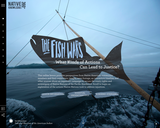
This online lesson provides perspectives from Native American community members and their supporters, images, news footage, an interactive timeline, and other sources about an important campaign to secure the treaty rights and sovereignty of Native Nations of the Pacific Northwest. Scroll to begin an exploration of the actions Native Nations took to address injustices.
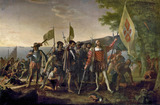
This inquiry by Ryan Theodoriches, Evergreen Public Schools, is based on the C3 Framework inquiry arc. The inquiry leads students through an investigation of the decision by the federal government of the United States to honor Christopher Columbus with a federal holiday as well as efforts to challenge the view that Columbus should be revered as a national hero.

Image source: "Writing" by Ramdlon at https://pixabay.com/en/writer-writing-paper-letter-author-605764/Unit Overview: The Writers on Writing Unit engages students in reading, analyzing, and creating literacy narratives, or stories about learning to read and write. The unit begins by asking students to view and read literacy narratives, and to analyze author’s literacy narratives through annotation, discussion, and writing a formal analysis essay. As students go through the narratives, they are asked to analyze author technique and purpose, paying close attention to style, syntax, and organization in preparation for writing their own authentic literacy narratives and ultimately creating digital storytelling projects about those narratives. By the end of this unit, students will have composed analysis writing, creative nonfiction, and multimedia stories. They will have had the ability to select certain reading assignments, to work in groups and with partners to brainstorm, edit, and revise, and they will have had guided writing lessons on composing strong sentences.

Unit Overview: The Writers on Writing Unit engages students in reading, analyzing, and creating literacy narratives, or stories about learning to read and write. The unit begins by asking students to view and read literacy narratives, and to analyze author’s literacy narratives through annotation, discussion, and writing a formal analysis essay. As students go through the narratives, they are asked to analyze author technique and purpose, paying close attention to style, syntax, and organization in preparation for writing their own authentic literacy narratives and ultimately creating digital storytelling projects about those narratives. By the end of this unit, students will have composed analysis writing, creative nonfiction, and multimedia stories. They will have had the ability to select certain reading assignments, to work in groups and with partners to brainstorm, edit, and revise, and they will have had guided writing lessons on composing strong sentences. Days 3 to 5 Overview: These plans are for Days 3 to 5 of the Writers on Writing Unit. On day 3, students listen to podcasts about different perspectives on struggling to read. They then complete a pre-assessment, reading and analyzing a literacy narrative with guided style analysis notes. Students will then review the pre-assessment activity in preparation for reading their own selections of professional literacy narratives on day 2. The lesson will culminate with students writing an analysis of a professional literacy narrative. Image source: "Idea" from Pxhere.com
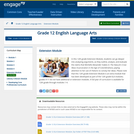
In this 12th grade Extension Module, students can go deeper into analyzing arguments, as they outline, analyze, and evaluate the claims that Michelle Alexander makes in|The New Jim Crow: Mass Incarceration in the Age of Colorblindness, paying attention to her use of rhetoric to convey her ideas. Please note that this 12th grade Extension Module is an extra module that has been developed as part of the 12th grade ELA modules; grades 9-11 do not have additional or extension modules. A full year of curriculum is available for 12th grade through modules 1-4.
Find the rest of the EngageNY ELA resources at https://archive.org/details/engageny-ela-archive .
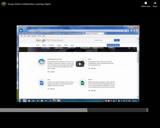
Video about group online collaboration in Social Media; Google Docs; Video Conferencing; and Virtual Worlds
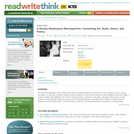
Students research, evaluate, and synthesize information about the Harlem Renaissance from varied resources, create an exhibit, and highlight connections across disciplines (i.e., art, music, and poetry) using a Venn diagram.

Local government is the government of people’s daily lives. It is your local government that you will interact with most throughout your daily life. In this seminar, you will learn about the role of local government in a community. By the end of this seminar, you will be able to discuss how local government and community members work together. You will be able to compare the structure of local government as a whole to the structure of the government in your community.Standards5.1.4 C - Explain the principles and ideals shaping local and state government.

Food waste is a major contributor to greenhouse gas. Wasted food and the resources to produce that food are responsible for approximately 8% of global greenhouse gas emissions. In this storyline, students learn about the resources required to produce food through following the carbon cycle and discover how food waste contributes to climate change. They will also learn the farm to table transport chain as well as how to conduct a food waste assessment. Finally, the students will research solutions to the problem of food waste and, as a final project, present one solution that they have thoroughly researched that can be applicable to their community. For CTE teachers, this storyline provides the basic knowledge needed to develop a deep understanding of WHY reducing food waste is an important solution to climate change. There are several potential extensions that Family Consumer Science teachers can utilize as well as Ag teachers and even Business teachers. There is a partial list at the end of the learning progressions.